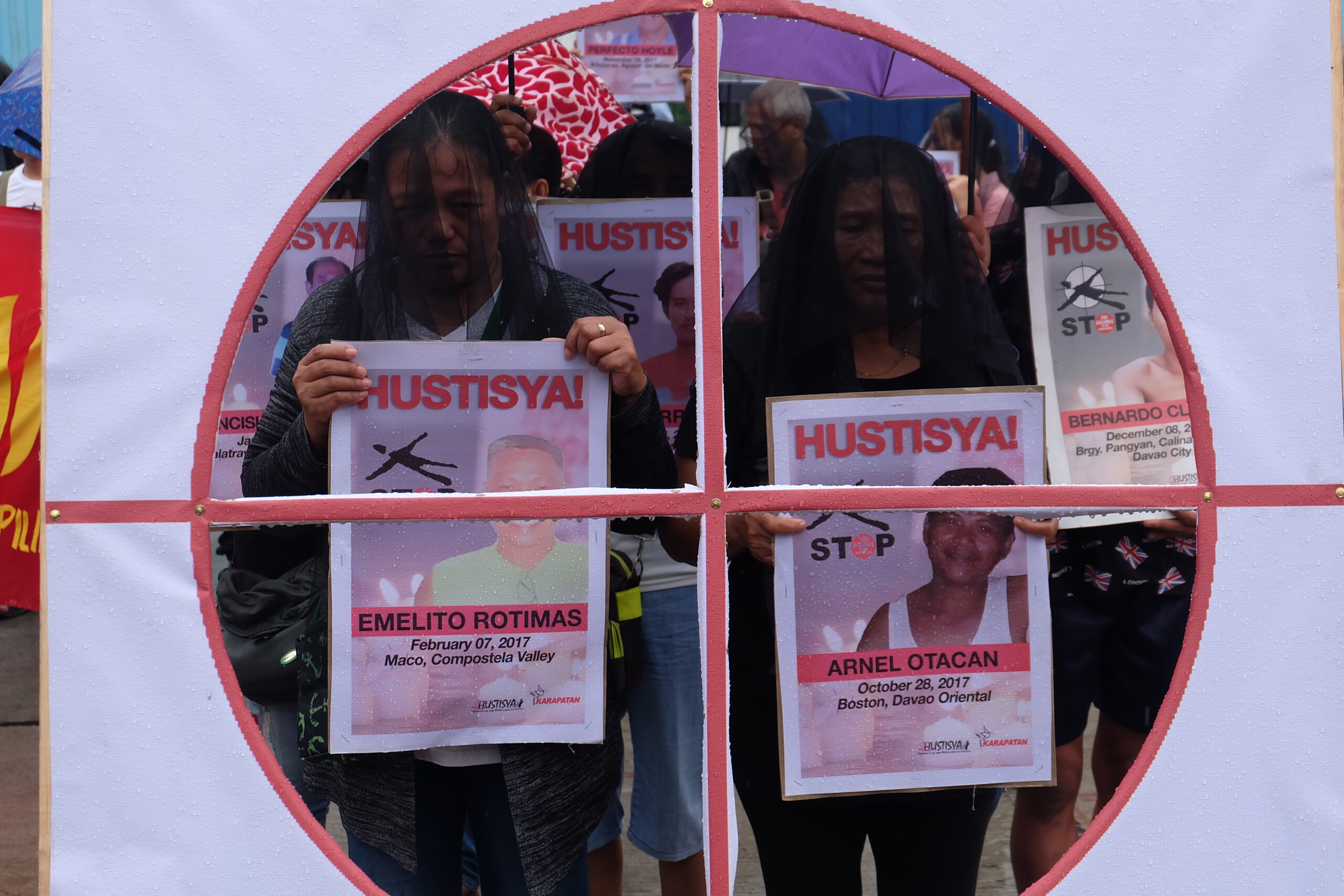Five days before the 4thState of the Nation Address (SONA) of President Rodrigo Duterte on July 22, relatives of victims of extrajudicial killings (EJKs) together with peasant groups and human rights advocates trooped to Department of National Defense (DND) in Camp Aguinaldo and at Philippine National Police (PNP) in Camp Crame, Quezon City.
The protesters condemned the killings under president Duterte’s administration and demanded justice for the victims.
In relation to the resolution of the United Nations Human Rights Council to investigate killings and the human rights situation in the Philippines, Clamor said that the Duterte administration cannot deny the extrajudicial killings and that they have not received justice.
“Naririto ang mga kamag-anak ng mga drug war killings. Sila mismo ang nagpapatotoo na may mga biktima at hanggang ngayon walang nakakamit na katarungan ang mga kaanak nila,” said Karapatan Deputy secretary general Roneo Clamor.
[The kin of drug war killings are here. They attest that there are victims and they continue to be denied justice for their relatives.]
Marisa Lazaro joined the protest to seek justice for the killing of her son. She stated that according to the first police report, her son fought back at the Marilao police during a checkpoint that led him to be killed by the police. But she got a photo that her son was handcuffed and that concluded for her that her son couldn’t fight back.
“Ang totoong nangyayari sa Pilipinas ang patayan hindi talaga natitigil, at may tatlong taon pa si Duterte baka ilan pa ang sumunod,” Lazaro said.
[The truth is that the killings in the Philippines has not stopped, and Duterte has three years so there might be more killings to follow.]
“Alam kong hindi na mabubuhay anak ko, pero ayoko na madagdagan pa ang mamamatay, dahil masakit talaga hindi mo maipapaliwanag kung gaano kasakit mawalan ng mahal sa buhay,” Lazaro said.
[I know my son will not come back to life, but I don’t want more to die because it is really painful, one can’t describe how painful it is to lose a loved one.]
According to the data of PNP from July 2016 to May 2019, at least 6,600 persons were killed under President Duterte’s war on drugs.
In March this year, the PNP said 29,000 cases of killings categorized as deaths under inquiry (DUI) have been recorded nationwide since President Duterte launched his crackdown on illegal drugs.
The term DUI was intended to differentiate killings that were committed outside the government’s anti-drug operations from those that were part of police operations. It means the same as the term used by the police today: “homicide cases under investigation” or “HCUI,” excluding killings by cops in police operations.
The killings that happened under police operations were referred to as “died during police operations” or “DPO.” They died because they allegedly resisted from police apprehension or fought back, or the now infamous term “nanlaban.” The PNP presumes the DPOs are regular, but critics liken these to EJKs.
Meanwhile, the data from civil society and media groups there counted 27,000 people have been killed in relation to drug war as of March 2019.
According to KARAPATAN, the numbers does not cover the killings of farmers and human rights defenders since Duterte took office.
They also mentioned that there were 266 killed in relation with Duterte’s counterinsurgency campaigns Oplan Kapayapaan and Oplan Kapanatagan; 216 of them were peasants.
“Malakas pong panawagan ng Kilusang Magbubukid ng Pilipinas, itigil ang pamamaslang, itigil ang pagpasalang sa mga magsasaka na lumilikha ng pagkain. Libo ang biktima ni Duterte sa kalunsuran, habang libo rin ang biktima sa kanayunan. Ang gawaing pagsasaka ay isang marangal na trabaho. Pinagmamalaki po namin ito at hindi ito gawaing terorismo.” Danilo Ramos, Secretary General of KMP, ended.
[The Philippine Peasant Movement calls loudly for the killings to stop, stop killing farmers who produce food. Thousands were victims of Duterte in the urban areas, while thousands were also victims in the countryside. Farming is a dignified livelihood. We are proud of it and this work is not terrorism.]





























